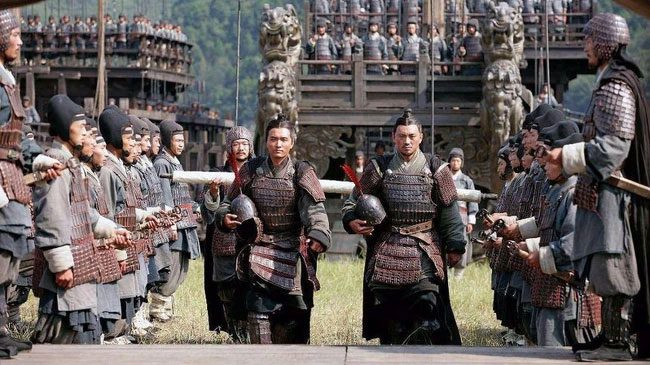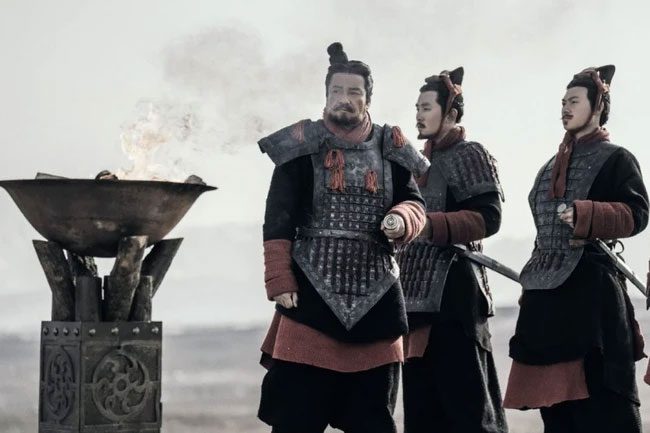Many historical films depict large-scale war scenes not only to serve the film’s narrative but also to help the audience understand the magnitude of warfare during feudal times.
In ancient feudal times, emperors did not hesitate to wage wars to expand territories, compete for benefits, and prevent foreign invasions. Sending many soldiers to the battlefield was truly necessary.
On the battlefield, soldiers and food supply are the most crucial issues. There is an old saying “No food, no way to uphold righteousness”, which highlights the importance of sustenance. Only with adequate nutrition can one maintain health and then pursue knowledge. However, few know that ancient armies had an unwritten rule prohibiting soldiers from eating to their fill during battles. This rule was based on several very practical reasons.

If soldiers are well-fed, there might be a food shortage later. (Illustrative image: Internet).
According to Sohu.com, the primary reason soldiers were not provided with sufficient food during ancient campaigns was the low productivity of food production, with annual grain yields being limited. If all soldiers were to be fully fed, it is likely that the food supply would not last until the war began.
Each time an army went to battle, many soldiers were sent, and wars often lasted several months. Thus, food rations were always a top concern. If all soldiers were well-fed, it could lead to a future food shortage, leaving soldiers with nothing to eat and potentially causing panic among them. A lack of food could also affect soldiers’ morale, leading to a decline in their spirits and even anxiety due to hunger.
The second reason is that during combat, one must always be vigilant. When well-fed, soldiers often feel sleepy, and if they are adequately nourished, they may become lax and less alert. Furthermore, overeating could cause inconvenience during movement.
Regarding the dietary habits of soldiers during feudal wars, there is a story of a general prohibiting soldiers from eating goat meat. The reason behind this ban has sparked much debate.
The story revolves around Bai Qi – one of the four famous generals from the Warring States period, who served the Qin state and achieved many great feats. He never lost in over seventy battles and helped the Qin king conquer half of the country. Most famous was the Battle of Changping; since the Qin state was located in the Northwest, soldiers often preferred beef and goat meat to satisfy their hunger, especially in the cold weather of the North. This would provide them with the strength to fight. However, Bai Qi ordered the army to refrain from eating goat meat, which surprised the soldiers.

Eating to fullness often leads to drowsiness, making soldiers more lax. (Illustrative image: Internet).
During the later stages of the Battle of Changping, Bai Qi devised many surprise attack plans. In addition to banning soldiers from eating goat meat, they were not allowed to light fires for cooking and could only eat cold food. Despite their dissatisfaction and anger, the soldiers dared not voice their complaints and had no choice but to obey orders. However, some soldiers decided to disobey; at night, they lit fires and cooked goat meat. The delicious aroma and loud noises awakened many other soldiers, who immediately rushed over to eat the goat meat.
Just as everyone was enjoying the meal, Bai Qi emerged from the camp, shouting: “How dare you violate military orders! Bring them out and give each of them 30 lashes!” While the soldiers were still confused about the situation, Bai Qi bluntly stated: “Goat meat has a very strong odor, and at night, with no wind, it can be smelled from 50 paces away. If there were wind, the smell would carry even further. If all soldiers eat goat meat, it would be like telling the enemy where we are. How can we fight in an ambush like this?”
Upon hearing this, the soldiers quickly realized their mistake and hurriedly discarded the goat meat. After this incident, the entire army strictly adhered to the “ban on goat meat.” Thanks to this, Bai Qi ultimately led the Qin army to victory in the Battle of Changping.


















































